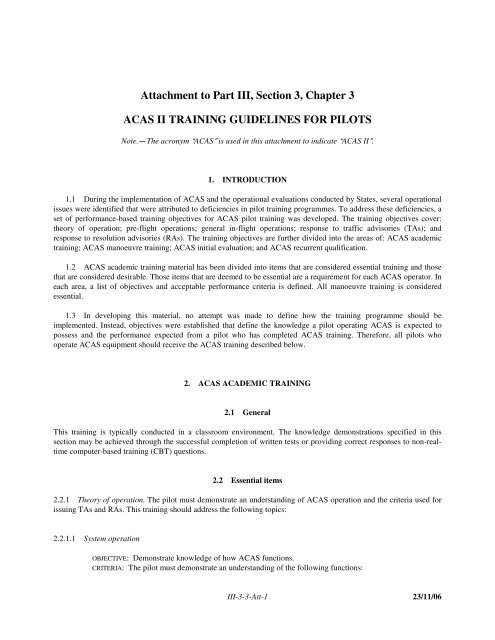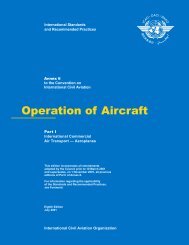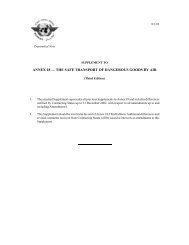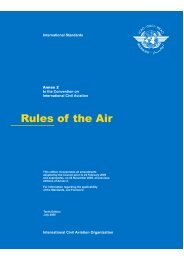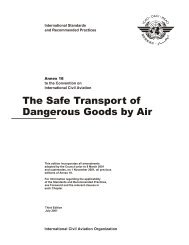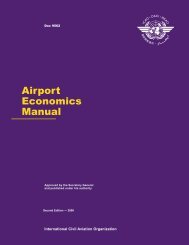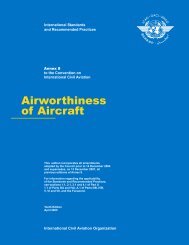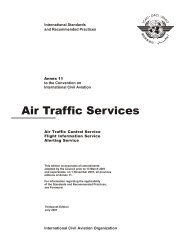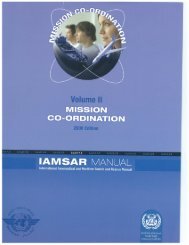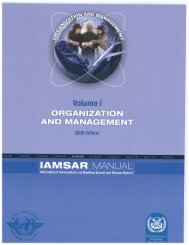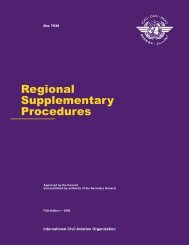- Page 1 and 2:
Doc 8168 OPS/611 Procedures for Air
- Page 3 and 4:
Doc 8168 OPS/611 Procedures for Air
- Page 5 and 6:
TABLE OF CONTENTS Page FOREWORD....
- Page 7 and 8:
Table of Contents (v) Chapter 4. In
- Page 9 and 10:
Table of Contents (vii) Chapter 3.
- Page 11 and 12:
Table of Contents (ix) Section 5. P
- Page 13 and 14:
Table of Contents (xi) Section 4. O
- Page 15 and 16:
(xiv) Procedures — Aircraft Opera
- Page 17 and 18:
(xvi) Procedures — Aircraft Opera
- Page 19 and 20:
(xviii) Procedures — Aircraft Ope
- Page 21 and 22:
(xx) Procedures — Aircraft Operat
- Page 23 and 24:
(xxii) Procedures — Aircraft Oper
- Page 25 and 26:
Section 1 DEFINITIONS, ABBREVIATION
- Page 27 and 28:
I-1-1-2 Procedures — Aircraft Ope
- Page 29 and 30:
I-1-1-4 Procedures — Aircraft Ope
- Page 31 and 32:
I-1-1-6 Procedures — Aircraft Ope
- Page 33 and 34:
I-1-2-2 Procedures — Aircraft Ope
- Page 35 and 36:
Section 2 GENERAL PRINCIPLES I-2-(i
- Page 37 and 38:
I-2-1-2 Procedures — Aircraft Ope
- Page 39 and 40:
I-2-1-4 Procedures — Aircraft Ope
- Page 41 and 42:
I-2-2-2 Procedures — Aircraft Ope
- Page 43 and 44:
I-2-2-4 Procedures — Aircraft Ope
- Page 45 and 46:
Chapter 3 TURN AREA CONSTRUCTION 3.
- Page 47 and 48:
23/11/06 Table I-2-3-1 Turn constru
- Page 49 and 50:
Part I — Section 2, Chapter 3 I-2
- Page 51 and 52:
f 1 h1 Part I — Section 2, Chapte
- Page 53 and 54:
Section 3 DEPARTURE PROCEDURES I-3-
- Page 55 and 56:
I-3-1-2 Procedures — Aircraft Ope
- Page 57 and 58:
I-3-1-4 Procedures — Aircraft Ope
- Page 59 and 60:
I-3-1-6 Procedures — Aircraft Ope
- Page 61 and 62:
I-3-2-2 Procedures — Aircraft Ope
- Page 63 and 64:
I-3-2-4 Procedures — Aircraft Ope
- Page 65 and 66:
Chapter 3 OMNIDIRECTIONAL DEPARTURE
- Page 67 and 68:
Part I — Section 3, Chapter 3 I-3
- Page 69 and 70:
I-3-4-2 Procedures — Aircraft Ope
- Page 71 and 72:
Section 4 ARRIVAL AND APPROACH PROC
- Page 73 and 74:
I-4-1-2 Procedures — Aircraft Ope
- Page 75 and 76:
I-4-1-4 Procedures — Aircraft Ope
- Page 77 and 78:
I-4-1-6 Procedures — Aircraft Ope
- Page 79 and 80:
I-4-1-8 Procedures — Aircraft Ope
- Page 81 and 82:
I-4-1-10 Procedures — Aircraft Op
- Page 83 and 84:
Chapter 2 ARRIVAL SEGMENT 2.1 PURPO
- Page 85 and 86:
I-4-3-2 Procedures — Aircraft Ope
- Page 87 and 88:
I-4-3-4 Procedures — Aircraft Ope
- Page 89 and 90:
I-4-3-6 Procedures — Aircraft Ope
- Page 91 and 92:
I-4-3-8 Procedures — Aircraft Ope
- Page 93 and 94:
Chapter 5 FINAL APPROACH SEGMENT 5.
- Page 95 and 96:
Part I — Section 4, Chapter 5 I-4
- Page 97 and 98:
Part I — Section 4, Chapter 5 I-4
- Page 99 and 100:
Part I — Section 4, Chapter 5 I-4
- Page 101 and 102:
I-4-6-2 Procedures — Aircraft Ope
- Page 103 and 104:
I-4-6-4 Procedures — Aircraft Ope
- Page 105 and 106:
I-4-7-2 Procedures — Aircraft Ope
- Page 107 and 108:
I-4-7-4 Procedures — Aircraft Ope
- Page 109 and 110:
I-4-7-6 Procedures — Aircraft Ope
- Page 111 and 112:
Chapter 8 CHARTING/AERONAUTICAL INF
- Page 113 and 114:
Part I — Section 4, Chapter 8 I-4
- Page 115 and 116:
Part I — Section 4, Chapter 8 I-4
- Page 117 and 118:
Part I — Section 4, Chapter 8 I-4
- Page 119 and 120:
Section 5 EN-ROUTE CRITERIA I-5-(i)
- Page 121 and 122:
I-5-1-2 Procedures — Aircraft Ope
- Page 123 and 124:
Section 6 HOLDING PROCEDURES I-6-(i
- Page 125 and 126:
I-6-1-2 Procedures — Aircraft Ope
- Page 127 and 128:
I-6-1-4 Procedures — Aircraft Ope
- Page 129 and 130:
I-6-1-6 Procedures — Aircraft Ope
- Page 131 and 132:
I-6-1-8 Procedures — Aircraft Ope
- Page 133 and 134:
Chapter 2 OBSTACLE CLEARANCE 2.1 HO
- Page 135 and 136:
Section 7 NOISE ABATEMENT PROCEDURE
- Page 137 and 138:
Chapter 2 NOISE PREFERENTIAL RUNWAY
- Page 139 and 140:
Chapter 3 AEROPLANE OPERATING PROCE
- Page 141 and 142:
Part I — Section 7, Chapter 3 I-7
- Page 143 and 144:
Part I — Section 7, Chapter 3 I-7
- Page 145 and 146:
I-7-3-App-2 Procedures — Aircraft
- Page 147 and 148:
Section 8 PROCEDURES FOR USE BY HEL
- Page 149 and 150:
Chapter 2 JOINT HELICOPTER/AEROPLAN
- Page 151 and 152:
Chapter 3 PROCEDURES SPECIFIED FOR
- Page 153 and 154:
Part I — Section 8, Chapter 3 I-8
- Page 155 and 156:
Procedures for Air Navigation Servi
- Page 157 and 158:
Chapter 1 GENERAL INFORMATION FOR R
- Page 159 and 160:
II-1-2-2 Procedures — Aircraft Op
- Page 161 and 162:
II-1-2-4 Procedures — Aircraft Op
- Page 163 and 164:
II-1-2-6 Procedures — Aircraft Op
- Page 165 and 166:
II-1-2-8 Procedures — Aircraft Op
- Page 167 and 168:
Chapter 4 GENERAL INFORMATION FOR S
- Page 169 and 170:
Section 2 DEPARTURE PROCEDURES II-2
- Page 171 and 172:
II-2-1-2 Procedures — Aircraft Op
- Page 173 and 174:
II-2-1-4 Procedures — Aircraft Op
- Page 175 and 176:
Chapter 2 AREA NAVIGATION (RNAV) DE
- Page 177 and 178:
Chapter 3 AREA NAVIGATION (RNAV) DE
- Page 179 and 180:
Section 3 ARRIVAL AND NON-PRECISION
- Page 181 and 182:
II-3-1-2 Procedures — Aircraft Op
- Page 183 and 184:
II-3-1-4 Procedures — Aircraft Op
- Page 185 and 186:
II-3-1-6 Procedures — Aircraft Op
- Page 187 and 188:
II-3-1-8 Procedures — Aircraft Op
- Page 189 and 190:
90° II-3-1-10 Procedures — Aircr
- Page 191 and 192:
Chapter 2 AREA NAVIGATION (RNAV) AR
- Page 193 and 194:
Chapter 3 AREA NAVIGATION (RNAV) AR
- Page 195 and 196:
Chapter 4 AREA NAVIGATION (RNAV) AR
- Page 197 and 198:
Chapter 6 AREA NAVIGATION (RNAV) AR
- Page 199 and 200: Chapter 1 APV/BARO-VNAV APPROACH PR
- Page 201 and 202: Part II — Section 4, Chapter 1 II
- Page 203 and 204: Part II — Section 4, Chapter 1 II
- Page 205 and 206: Section 5 PRECISION APPROACH PROCED
- Page 207 and 208: Section 6 RNAV HOLDING II-6-(i)
- Page 209 and 210: Chapter 2 HOLDING PATTERNS 2.1 Some
- Page 211 and 212: Chapter 3 HOLDING ENTRY 3.1 Except
- Page 213 and 214: II-6-4-2 Procedures — Aircraft Op
- Page 215 and 216: II-6-4-4 Procedures — Aircraft Op
- Page 217 and 218: Chapter 1 AREA NAVIGATION (RNAV) AN
- Page 219 and 220: Section 1 ALTIMETER SETTING PROCEDU
- Page 221 and 222: III-1-1-2 Procedures — Aircraft O
- Page 223 and 224: III-1-2-2 Procedures — Aircraft O
- Page 225 and 226: III-1-2-4 Procedures — Aircraft O
- Page 227 and 228: III-1-3-2 Procedures — Aircraft O
- Page 229 and 230: III-1-3-4 Procedures — Aircraft O
- Page 231 and 232: III-1-4-2 Procedures — Aircraft O
- Page 233 and 234: III-1-4-4 Procedures — Aircraft O
- Page 235 and 236: III-1-4-6 Procedures — Aircraft O
- Page 237 and 238: Chapter 1 MODES OF OPERATION 1.1 IN
- Page 239 and 240: Part III — Section 2, Chapter 1 I
- Page 241 and 242: Part III — Section 2, Chapter 1 I
- Page 243 and 244: Part III — Section 2, Chapter 1 I
- Page 245 and 246: Chapter 1 OPERATION OF TRANSPONDERS
- Page 247 and 248: Part III — Section 3, Chapter 1 I
- Page 249: Chapter 3 OPERATION OF AIRBORNE COL
- Page 253 and 254: Part III — Section 3, Chapter 3,
- Page 255 and 256: Part III — Section 3, Chapter 3,
- Page 257 and 258: Part III — Section 3, Chapter 3,
- Page 259 and 260: Part III — Section 3, Chapter 3,
- Page 261 and 262: Section 4 OPERATIONAL FLIGHT INFORM
- Page 263 and 264: III-4-1-2 Procedures — Aircraft O
- Page 265 and 266: Chapter 3 STABILIZED APPROACH PROCE
- Page 267 and 268: Section 5 STANDARD OPERATING PROCED
- Page 269 and 270: III-5-1-2 Procedures — Aircraft O
- Page 271 and 272: III-5-2-2 Procedures — Aircraft O
- Page 273 and 274: Chapter 3 CREW BRIEFINGS 3.1 GENERA
- Page 275 and 276: Part III — Section 5, Chapter 3 I
- Page 277 and 278: Section 6 VOICE COMMUNICATION PROCE
- Page 279: © ICAO 2006 10/06 Published by ICA


